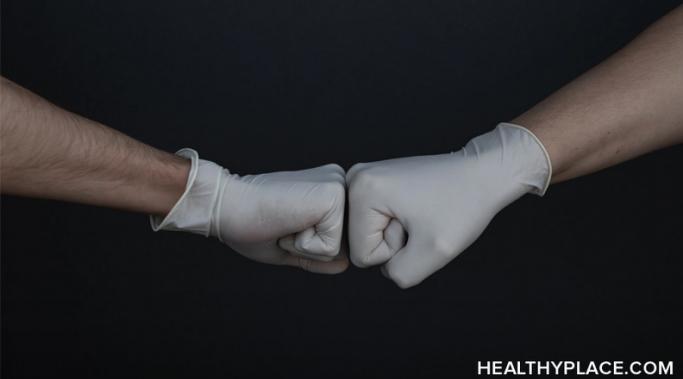Blogs
Countless times, people have told me that a person can only start to heal if they are ready to do the work themselves. They can't be forced into improving their lives. Despite hearing this message over and over, part of me really thought I could convince other people to heal and "get better" if I just said and did the right thing. This probably comes from a history of being responsible for co-regulating my parents' emotions. I grew up having to say and do the right thing to maintain my worth, and for a long time, that felt normal.
How to help your child cope with autistic meltdowns is a question for many parents. Recently, on a message board for autistic adults and allies, a parent asked for some advice on helping her child with his autistic meltdowns. While these sorts of groups and message boards weren’t around when I was young, I sure wish my mom had done this sort of thing when I was a kid.
When we were little, I spoke on behalf of my brother a lot because he had a speech delay. He would regularly mix up or mispronounce his words, and I would find myself acting as some sort of amateur translator when he spoke to anyone outside our immediate family. My most commonly used phrase was, "What he's trying to say is . . ."
Medical consensus in psychiatry is critical. Many people do have many opinions, of course, but understanding psychiatric medical consensus is what makes all the difference. If you have 1000 psychiatrists in a room, after all, you can be guaranteed someone is going to disagree on any subject, but who do you believe, the 999 or the one? And is a medical consensus in psychiatry worth more than the opinion of psychiatric patients?
Healthy boundaries can be hard to recognize. For example, have you ever had someone set a boundary with you but it didn't feel right? Maybe they stated in such a way that it was hard to know if it was a legitimate boundary or a manipulation. Perhaps you have been manipulative with others but framed it as setting a boundary. This can be a confusing dynamic in interpersonal relationships and I've certainly struggled with it myself at times. Let's take a look at how you can tell if someone is setting a healthy boundary or being manipulative.
Does the thought of going to the dentist or having dental procedures done cause your anxiety to skyrocket? If so, you're not alone. A whopping 50-80 percent of American adults report having some degree of anxiety about going to the dentist, and a study published in 2017 indicated that 19 percent of people showed moderate to severe dental anxiety and almost seven percent indicated a high degree of such anxiety.
I’ve talked in previous blogs about empathy, and how it’s essential for anyone with anxiety. Or any other mental illness. Or any other member of the human race.
Just this morning, I opened my email inbox and noticed a subject line which read, "How many steps should you take to lose weight?" As someone who continues to battle thoughts of anorexia on a daily basis, my first reaction to seeing this was to click the email thread, so I could know the answer. I was even tempted to scroll through my mobile fitness tracker to ensure I habitually reach the step count required. But since I am also in committed recovery now, this initial reflex was supplanted by another, more constructive question: "Can fitness trackers worsen eating disorder behaviors?" Could monitoring the number of steps taken, floors climbed, miles run or walked, and calories burned increase the obsessive patterns which eating disorders thrive on? Based on my own experience, I think that answer is, "Yes."
Learning to embrace change will build stronger self-esteem. Instead of spending energy trying to keep things from changing, I have learned to focus on adapting to change for a healthier self-esteem. To do this, I rely on routines and regular prioritization of my needs.
Can a pet relieve the depression and anxiety of dissociative identity disorder (DID)? Let's imagine this: picture yourself in the middle of a panic attack. Your heart is racing, your mind is juggling a million thoughts, and no one can calm you down. Then, you reach for something soft, cuddly, and receptive to your need for comfort. This is what it feels like to turn to a pet for the anxiety and depression associated with DID.








